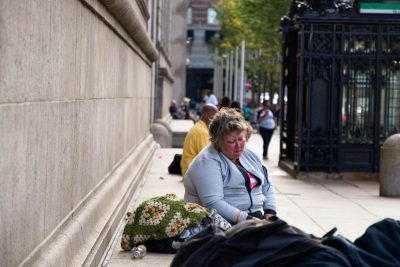As COVID-19 continues its spread throughout Massachusetts and the globe, homeless populations are at high risk of infection in the event of an outbreak when housed in traditional, tightly-packed shelter environments.
In order to follow Centers for Disease Control and Prevention guidelines for social distancing, advocacy groups are pushing for the redistribution of individuals in need of shelter into alternative sites. Possible contenders include school gyms, college dorms, hotels, sports facilities and unoccupied buildings.

Kelly Turley, associate director of the Massachusetts Coalition for the Homeless, said Boston has seen efforts at implementing a number of creative solutions, such as setting up heated tents and utilizing sports arenas and trailers.
“We have to be creative to make sure that the resources can be brought on quickly,” Turley said, “but we can’t really wait any longer to start providing people experiencing homelessness with that additional space, and making sure that the spaces are hygienic and properly maintained.”
The Massachusetts Coalition for the Homeless has been in conversation with state agencies and legislative offices to have its recommendations implemented, but is still awaiting final decisions. Turley said timely action is important, and that she anticipates a decline in the use of shelters amid current health risks.
“We know and are starting to hear that more people experiencing homelessness feel uneasy going into shelter settings given the risk,” Turley said, “and so we anticipate that even more people will be unsheltered during this time.”
Joe Finn, president of the Massachusetts Housing and Shelter Alliance, said people in shelters are at a particularly high risk of infection not only because shelters lack the spatial dimensions to be able to practice social distancing, but also because most people in the shelter system are older and many have comorbid medical conditions.
Finn said shelter staff and volunteers who interact with a high volume of people flowing in and out are also put at “tremendous” risk.
“We already know that there’s a shortage of personal protective equipment in the healthcare system that you read about all the time, but what people seem to be forgetting is that the shelter workers are working in close proximity to people coming in,” Finn said. “We’re hoping that the state doesn’t forget this working group that’s out there. So that’s very, that’s very stressful.”
Finn said the issue needs to be addressed at the local level, pointing to Worcester as an example. In Worcester, City Manager Edward Augustus and Health and Human Services Commissioner Matilde Castiel created a plan to depopulate shelters and redistribute people into spaces like college dorms and school gyms, in groups of no more than 25.
Social distancing poses not only the challenge of relocating people who rely on shelters, Finn said, but also the issue of providing assistance to disabled people living in permanent supportive housing, of which there are currently 8,400 units in Massachusetts.
“It’s become kind of a challenging thing there as well to make sure that staff has what they need to address the needs of those folks,” Finn said. “We’re trying to make sure of the remote types of counseling and remote check-ins and things like that, but really the people in this population don’t have, for example, even a cell phone, so it’s going to be challenging.”
Kerry O’Brien, deputy director of media and public relations at Boston’s Department of Neighborhood Development, said the City has made preparations in the event of an outbreak among the homeless population in Boston.
“We’ve already located different areas to put someone if we notice that they are ill,” O’Brien said. “Health Care for the Homeless is handling all of that.”
Partnering with local shelters and hospitals, the Boston Health Care for the Homeless Program includes measures to screen and test a large number of people as well as to isolate those diagnosed with the virus.
Finn said that while Boston has a plan, this is not yet the case for the rest of the state.
“We keep advocating for the Massachusetts emergency management people and the state to come up with a plan to address this,” Finn said. “What we’re hoping is that the state system is going to have a quarantine system in place soon … so they can be isolated.”




























































































































